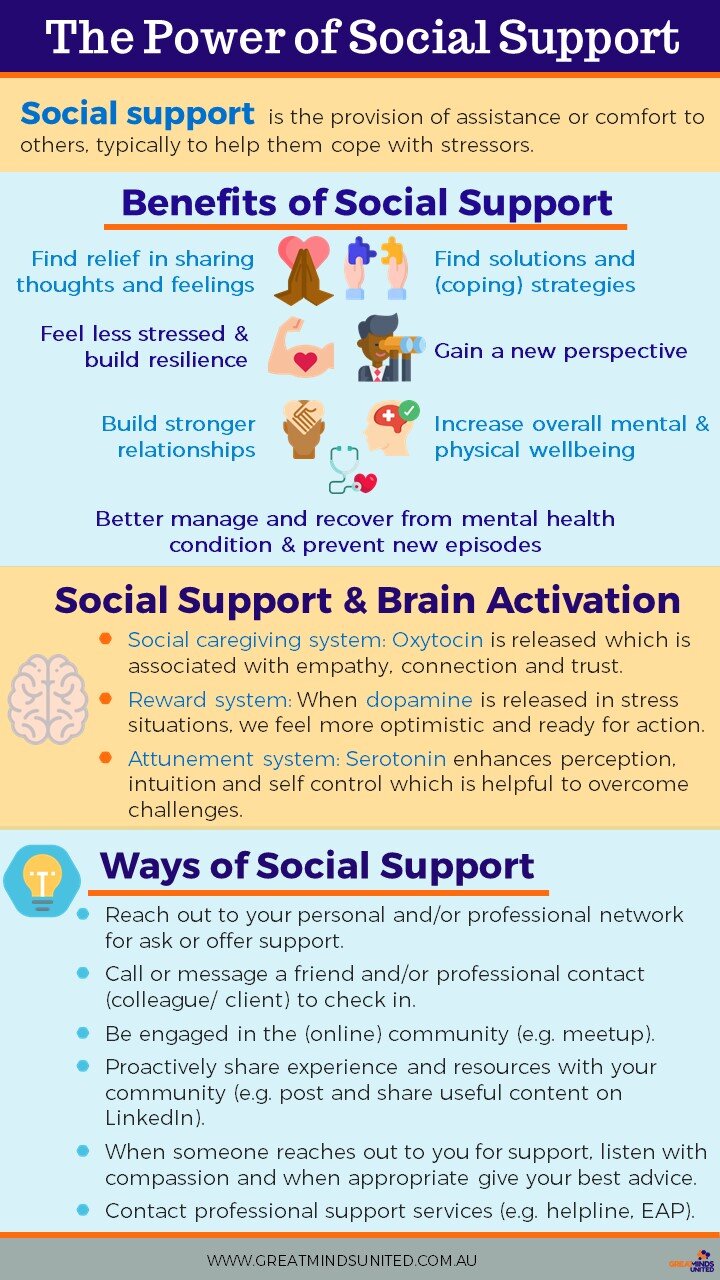The Power of Social Support: Resilience through People (PLUS infographic)
By Nadja Conaghan
No doubt, we are living in very challenging and stressful times where our resilience, values and beliefs are challenged. The current restrictions (e.g. social distancing), new challenges and uncertainties cause high (chronic) stress; and increase the risk of developing mental health issues when not managed well. [1] [2] In fact, mental health conditions such as depression, anxiety, sleeping disorders and burnout are on the rise since COVID-19. [3] [4]
No matter how difficult these times are, they bring an opportunity for growth and even thrive by being resilient. [5] One of the most powerful resilience tools is social support and connectedness, especially in the fight against loneliness and social isolation.
Asking for and getting support can help us finding solutions and (coping) strategies, gaining a new perspective, finding relief in sharing thoughts and feelings, building stronger relationships, and feeling less stressed. [3] [6] Social support is important for our physical and mental health. [4] Studies have shown, positive social support can increase our resilience as well as our overall mental and physical wellbeing; and it is proven that social support helps people with a mental condition (e.g. PTSD or depression) to better manage and recover from their mental condition and prevent new episodes.
Research confirms that social support and connectedness are good for both, the receiver and giver of social support. Giving and receiving social support impacts our brain chemistry and neurological response [7]:
Activation of our social care-giving system: Oxytocin is released which is associated with empathy, connection and trust. Oxytocin is often referred as bonding hormone.
Activation of our reward system: The released Dopamine increases our motivation while reducing our fear. When dopamine is released while we experience stress, we feel more optimistic and our brains are primed for physical action.
Activation of our attunement system: The released Serotonin enhances our perception, intuition and self control. This helps us to understand what actions are needed to overcome the challenge.
In times of social distancing and self-isolation, social support becomes more difficult but is not impossible. Here are some ways to give and receive social support in your personal and professional network:
Reach out to your personal and/or professional network for ask or offer support. For example, write a LinkedIn post to offer (free) support or ask for support (e.g. “looking for new opportunities”).
Call or message a friend or professional contact (colleague/ client) to check in. For example, go through your contact list and send one check-in message every day until you reach the end of your list.
Be engaged in the (online) community (e.g. meetup groups, webinars, LinkedIn and Facebook groups).
Proactively and freely share experience and resources with your community (e.g. post and share useful content, or you perceptions and thoughts).
When someone reaches out to you for support, listen with compassion and when appropriate give your best advice. Sometimes all we need is someone to listen to us and say it is okay and they are not alone.
Contact professional support services (helpline). There are many fantastic organisations that offer (free) counselling to support the community and develop strategies with you become more resilient and overcome any barriers that are holding you back (below a list of Australian counselling services and hotlines).
List of professional social support services
Some professional social support and help(line) services in Australia:
Lifeline: https://www.lifeline.org.au/
Beyond Blue (specialised depression, suicide, anxiety disorders and other related mental illnesses): https://www.beyondblue.org.au/
Blackdog: https://www.blackdoginstitute.org.au/
Yourtown - KidsHelpline: https://www.yourtown.com.au/
Talk to your manager or HR about Employer Assistance Program (EAP)
SIMILAR BLOGS AND ARTICLES
If you are interested in this topic, you may also like:
Sources and References
[2] Great Minds United Blog: Coping with COVID-19: Current Trends and A Possible Way Out
[3] Vinkers, C. H., van Amelsvoort, T., Bisson, J. I., Branchi, I., Cryan, J. F., Domschle, K., Howes, O. D., Manchia, M., Pinto, L., de Quervain, D., Schmidt, M. V. & van der Wee, N. C. A. (2020). Stress Resilience During the Coronavirus Pandemic. European Neuropsychopharmacology 35, 12-16. https://doi.org/10.1016/j.euroneuro.2020.05.003
[4] Ozbay, f., Johnson, D. C., Dimoulas, E., Morgan, C. A. III, Charney, D. & Southwick, S. (2007). Social Support and Resilience to Stress. Psychiatry (Edgmont), 4(5), 35-40.
https://www.ncbi.nlm.nih.gov/pmc/articles/PMC2921311/
[5] Great Minds United Blog: Resilience for Life
[6] https://www.lifeline.org.au/get-help/topics/asking-for-help-help-seeking
[7] McGonigal, Kelly. (2015). The upside of stress: Why Stress is good for you (and how to get good at it). Vermillion.



